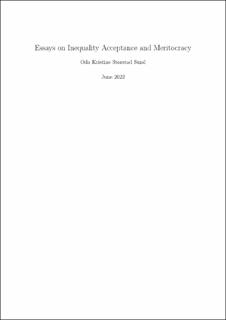| dc.description.abstract | Religious beliefs shape how people view the world and may be of great
importance for understanding people’s attitudes to inequality. In this study,
we investigate whether religious people differ from non-religious people in
their inequality acceptance. We utilize the Fairness Across the World data
set, which provides individual-level data from 60 countries on both inequality
acceptance and religiosity. It allows us to compare how religious and nonreligious
people across the world make consequential redistributive decisions
in identical economic environments, where the source of inequality and cost
of redistribution is manipulated. We find that the inequality acceptance of
religious individuals is less sensitive to the source of inequality than that of
non-religious individuals. These findings hold across definitions of religious
affiliation and empirical specifications. Taken together, our findings suggest
that religiosity is an important predictor of people’s fairness views. | en_US |
